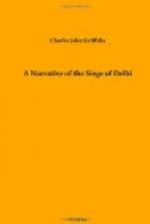August 6.—At 7 a. m. on August 6 the alarm again sounded, and we remained accoutred in camp for some hours, but were not called to the front on that day. A large party of the enemy’s cavalry—more, it must be supposed, in a spirit of bravado than anything else—charged up the road towards the Flagstaff Tower, waving their swords and shouting, “Din! din!” A battery was brought to bear on them, and this, with a volley or two of musketry, soon sent them to the right about, galloping off and disappearing amongst the trees, after leaving some dead on the ground.
The enemy’s infantry also harassed the pickets on the right flank, causing some casualties, and their artillery fire was kept up all day, the guns in the new Kishenganj battery almost enfilading the right of our position. No efforts on our part could silence the fire from this place, and it remained intact, a constant source of annoyance, to the end of the siege.
The numerous cavalry of the enemy might have caused us a vast amount of trouble had they been properly led, or behaved even as well as the infantry and artillery. But there seemed to be little dash or spirit amongst them, and though they made a brave show, emerging from the gates in company with the rest of their forces, waving swords and brandishing spears, they took care to keep at a respectful distance from our fire, their only exploit, as far as I can remember, being that on July 9, when 100 horsemen charged into the rear of our camp.
From the 8th to the 11th there were constant attacks on all the pickets, and the artillery fire on both sides was almost unceasing. The enemy brought out some guns by the Kashmir Gate and shelled the Metcalfe pickets, their skirmishers advancing close to our defences with shouts, and harassing the men day and night, though with small loss on our side. They also made the approach to the pickets for relief so perilous that at early morn of the 12th a large force, under Brigadier Showers, was detailed to drive the rebels into the city. My regiment furnished twenty men, under an officer,[5] on this occasion.
August 12.—We attacked them at dawn, taking them completely by surprise, and capturing all their guns, four in number. The 1st Fusiliers and Coke’s Rifles behaved most gallantly, and bore the brunt of the fight, losing half the number of those killed and wounded—namely, 110. The enemy’s casualties amounted to upwards of 300, and they left many wounded on the ground, who were shot and bayoneted without mercy. This signal chastisement had the effect of cowing them for a time, and the pickets on the left were unmolested for the future, save by occasional shots from the city batteries.
August 14.—August 14 was quiet, the enemy giving us a respite and scarcely firing a gun, though they must have known of the welcome reinforcements we had received that morning. These consisted of nearly 3,000 men, of which number more than 1,100 were Europeans.




